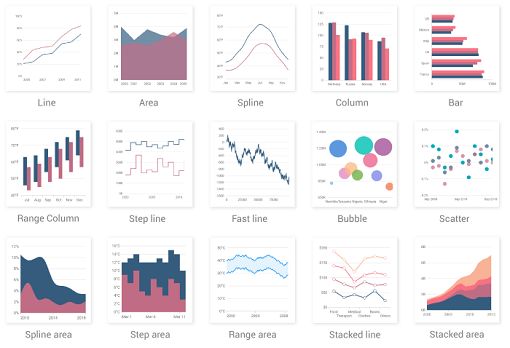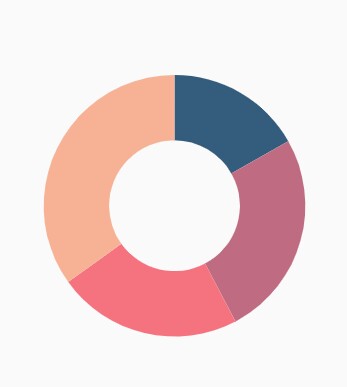Mastering Syncfusion Flutter Doughnut Chart: A Complete Information
Associated Articles: Mastering Syncfusion Flutter Doughnut Chart: A Complete Information
Introduction
With nice pleasure, we are going to discover the intriguing subject associated to Mastering Syncfusion Flutter Doughnut Chart: A Complete Information. Let’s weave fascinating info and supply recent views to the readers.
Desk of Content material
Mastering Syncfusion Flutter Doughnut Chart: A Complete Information

Syncfusion’s Flutter Doughnut chart presents a strong and versatile strategy to visualize knowledge in a round format, highlighting proportions and segments inside an entire. In contrast to pie charts, doughnut charts present a further internal area, usually used to show a title, abstract statistic, or emblem, enhancing the visible enchantment and data density of your software. This text delves deep into the capabilities of the Syncfusion Flutter Doughnut chart, exploring its options, customization choices, and sensible implementation with detailed code examples.
Understanding the Fundamentals: Information Binding and Fundamental Configuration
The inspiration of any efficient chart lies in its knowledge supply. The Syncfusion Flutter Doughnut chart seamlessly integrates with varied knowledge constructions, together with lists of maps and customized knowledge lessons. Let’s begin with a easy instance utilizing an inventory of maps:
import 'package deal:flutter/materials.dart';
import 'package deal:syncfusion_flutter_charts/charts.dart';
void essential()
runApp(MyApp());
class MyApp extends StatelessWidget
@override
Widget construct(BuildContext context)
return MaterialApp(
residence: Scaffold(
appBar: AppBar(title: Textual content('Syncfusion Doughnut Chart')),
physique: SfCircularChart(
collection: <CircularSeries>[
DoughnutSeries<Map<String, dynamic>, String>(
dataSource: <Map<String, dynamic>>[
'x': 'Category A', 'y': 35,
'x': 'Category B', 'y': 25,
'x': 'Category C', 'y': 40,
],
xValueMapper: (Map<String, dynamic> knowledge, _) => knowledge['x'],
yValueMapper: (Map<String, dynamic> knowledge, _) => knowledge['y'],
)
],
),
),
);
This code snippet demonstrates a primary doughnut chart with three classes (‘Class A’, ‘Class B’, ‘Class C’) and their corresponding values (35, 25, 40). xValueMapper maps the class title (‘x’ key) to the X-axis, and yValueMapper maps the worth (‘y’ key) to the Y-axis, figuring out the phase measurement.
Superior Information Binding and Customization:
The facility of Syncfusion’s chart lies in its flexibility. Let’s discover extra subtle knowledge binding strategies and customization choices. Think about using a customized knowledge class for higher group:
class SalesData
remaining String class;
remaining double gross sales;
SalesData(this.class, this.gross sales);
// ... inside the MyApp construct methodology ...
SfCircularChart(
collection: <CircularSeries>[
DoughnutSeries<SalesData, String>(
dataSource: <SalesData>[
SalesData('Category A', 35),
SalesData('Category B', 25),
SalesData('Category C', 40),
],
xValueMapper: (SalesData knowledge, _) => knowledge.class,
yValueMapper: (SalesData knowledge, _) => knowledge.gross sales,
)
],
),This strategy enhances code readability and maintainability. Now, let’s delve into visible customization:
-
Colours: Customise phase colours utilizing the
pointColorMapperproperty:
pointColorMapper: (SalesData knowledge, _) => knowledge.class == 'Class A' ? Colours.purple : knowledge.class == 'Class B' ? Colours.blue : Colours.inexperienced,- Exploding Segments: Spotlight particular segments by "exploding" them:
explode: true, // Explodes all segments
explodeIndex: 0, // Explodes solely the primary phase- Information Labels: Show knowledge values straight on the segments:
dataLabelSettings: DataLabelSettings(isVisible: true),- Legends: Add a legend to affiliate colours with classes:
legend: Legend(isVisible: true),- Internal Ring Customization: Leverage the internal ring area successfully:
innerRadius: '50%', // Modify internal ring measurementYou’ll be able to even add a textual content or picture inside the internal ring utilizing customized portray.
Interactive Options: Enhancing Consumer Engagement
Syncfusion’s Flutter Doughnut chart is not simply static; it is interactive. Options like tooltips and choice improve consumer engagement:
- Tooltips: Show detailed info on hover:
tooltipBehavior: TooltipBehavior(allow: true),- Choice: Enable customers to pick segments:
selectionBehavior: SelectionBehavior(allow: true),- Trackball: Show knowledge values for hovered factors:
trackballBehavior: TrackballBehavior(allow: true),These interactive parts present helpful context and insights, reworking a static visualization right into a dynamic and fascinating expertise.
Superior Strategies and Efficiency Optimization:
For big datasets, efficiency optimization is essential. Syncfusion’s chart employs environment friendly rendering strategies, however additional optimization will be achieved:
- Information Pagination: Load and render knowledge in chunks as an alternative of loading the complete dataset directly.
- Information Filtering: Enable customers to filter knowledge based mostly on particular standards to enhance efficiency and give attention to related info.
- Animation: Whereas visually interesting, animations can influence efficiency with giant datasets. Take into account disabling or optimizing animations for higher responsiveness.
Integrating with Different Widgets and Themes:
Seamless integration with different Flutter widgets is important for constructing cohesive consumer interfaces. The Syncfusion Doughnut chart integrates easily with varied widgets like Scaffold, Container, and Column. Moreover, it respects Flutter’s theming system, permitting simple customization to match your software’s total fashion.
Actual-World Functions and Use Circumstances:
The Syncfusion Flutter Doughnut chart is extremely versatile and finds software in various eventualities:
- Market Share Evaluation: Visualize market share amongst rivals.
- Gross sales Efficiency: Illustrate gross sales breakdown throughout totally different product classes or areas.
- Price range Allocation: Present the distribution of finances throughout totally different departments or initiatives.
- Demographic Information: Characterize demographic breakdowns based mostly on age, gender, or location.
- Web site Visitors Sources: Visualize the sources of web site visitors (e.g., natural search, social media, paid promoting).
Conclusion:
Syncfusion’s Flutter Doughnut chart is a strong and versatile instrument for creating visually interesting and informative knowledge visualizations. Its wealthy function set, customization choices, and environment friendly efficiency make it a really perfect alternative for a variety of purposes. By mastering its capabilities, builders can create partaking and insightful knowledge visualizations that improve consumer understanding and decision-making inside their Flutter purposes. This complete information has offered a stable basis for exploring its options, and additional experimentation with the in depth documentation and examples offered by Syncfusion will unlock its full potential. Bear in mind to at all times contemplate your knowledge measurement and consumer interplay wants when selecting and configuring your doughnut chart for optimum efficiency and consumer expertise.








Closure
Thus, we hope this text has offered helpful insights into Mastering Syncfusion Flutter Doughnut Chart: A Complete Information. We thanks for taking the time to learn this text. See you in our subsequent article!